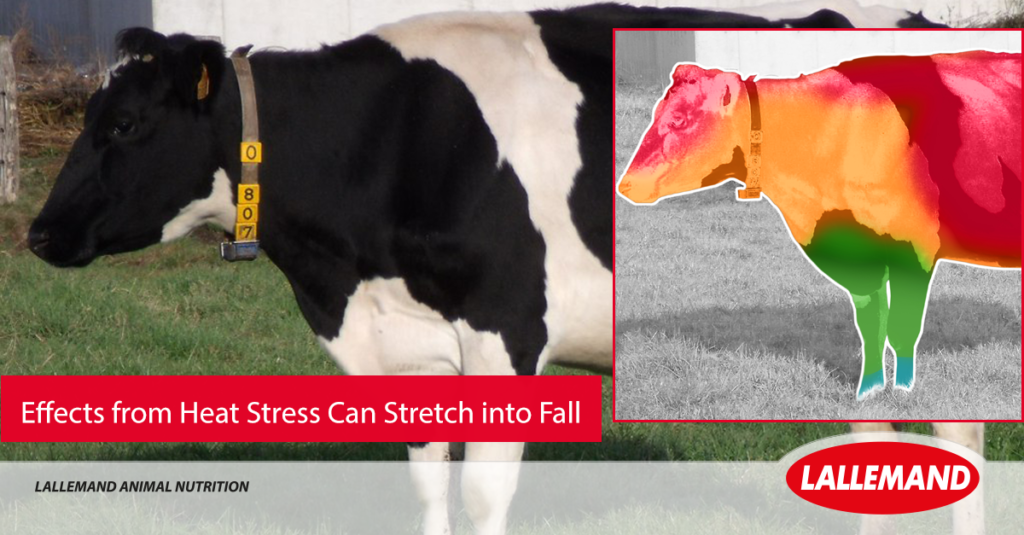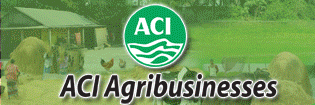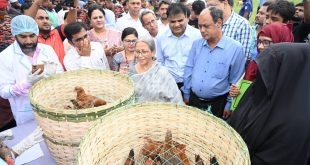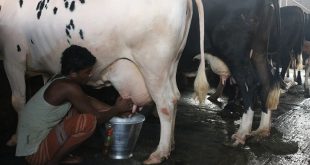 The effects of heat stress can continue long after cooler weather has arrived — even for cows not in milk. In fact, research has shown that proper cooling in the dry period improved subsequent lactation by up to 16 pounds more milk per day and 20 pounds more 3.5-percent fat-corrected milk (FCM) per day.1
The effects of heat stress can continue long after cooler weather has arrived — even for cows not in milk. In fact, research has shown that proper cooling in the dry period improved subsequent lactation by up to 16 pounds more milk per day and 20 pounds more 3.5-percent fat-corrected milk (FCM) per day.1
“Most producers pay careful attention to the heat stress on their lactating cows, but dry cows need the same attention,” says H. Nielsen, DVM, Technical Services – Ruminant, Lallemand Animal Nutrition. “Heat stress takes a toll on every member of the herd, and the effects don’t simply dissipate when the stressor is over.”
Stress of any kind can cause animals to divert energy from performance, and their bodies do not quickly shift back into production-mode when the period is over. In research on heat-stressed herds, the period of lowest milk production occurred two months after the highest ambient temperature,2 Dr. Nielsen notes.
University of Florida research showed heat stress can even affect the growth and future milk production of calves in-utero. These calves were born earlier with decreased weight at birth and decreased reproductive performance as heifers. Their productivity struggled even after entering the lactating herd, where they experienced reductions in milk production nearing 11 pounds per day during peak lactation.3
In addition to persistent productivity losses, herds also can experience lowered immune function after a stressful event.
“It’s common for producers to see increased incidence of diseases after a stressful event,” Dr. Nielsen says. “Not just heat stress, but any time where the animal experiences changes in her environment like pen movements or even ration changes. It’s critical to maintain feed intake and keep up a robust immune system that’s primed to fight off health challenges.”
Probiotics are an easy, cost-effective way to support the immune system of cattle against everyday natural challenges. The right probiotic can initiate an active process of stimulating microflora — the dynamic and robust bacterial communities in the lower intestinal tract — to enhance lower gut health. The lower gut signals to the rest of the body, which stimulates the innate immune system, Dr. Nielsen explains.
One probiotic, Saccharomyces cerevisiae boulardii CNCM I-1079 has been proven to positively modulate the immune system of cattle during times of stress. In a study, S. c. boulardii CNCM I-1079 supported higher peak milk and resulted in fewer health events for transition cows.4
He advises that producers still must lay the foundation for reduced stress by providing clean, readily available water; using adequate heat abatement techniques like providing shade, fans and/or sprinklers; and ensuring cattle are fed during the cooler times of the day to keep intake up.
“We’re only beginning to see the long-term effects of heat stress in our herds. Probiotics are a relatively new tool in helping fight against these negative effects,” Dr. Nielsen says. “It’s going to take all of our tools to protect cattle and keep performance up during — and long after — stressful periods end.”
1 Amaral BC, Connor EE, Tao S, Hayen J, Bubolz J, Dahl GE. Heat-stress abatement during the dry period: does cooling improve transition into lactation? J Dairy Sci. 2009 Dec;92(12):5988-99.
2 Tao S, Dahl GE. Invited review: heat stress effects during late gestation on dry cows and their calves. J Dairy Sci.2013 Jul;96(7):4079-93.
3 Borchers M and Bewley J. The Effects of Stress on Transition Cow and Calf Health. University of Kentucky Department of Animal and Food Sciences. Accessed Feb. 23, 2017. Available at: https://afs.ca.uky.edu/dairy/effects-stress-transition-cow-and-calf-health.
4 Nielsen H, Health and production of Holstein cows fed ProTernative during the transition period and early lactation. Lallemand Animal Nutrition Internal Report.
Source : http://lallemandanimalnutrition.com/en/europe/whats-new/effects-from-heat-stress-can-stretch-into-fall-cows/
 Agrinews24 কৃষির সাথে, কৃষকের পাশে
Agrinews24 কৃষির সাথে, কৃষকের পাশে




















